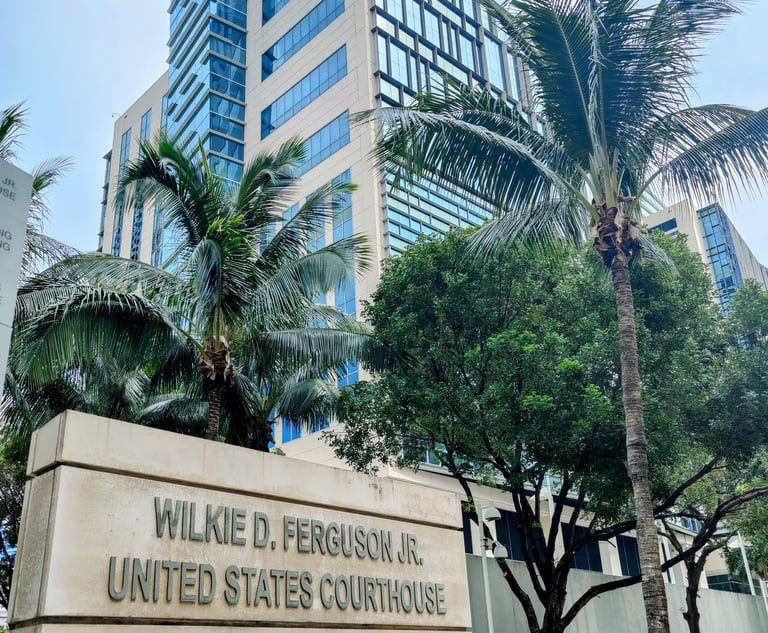 Rows of medical marijuana plants. Credit: FGunn/Shutterstock.com
Rows of medical marijuana plants. Credit: FGunn/Shutterstock.comFlorida House Gets Green Light to Join Marijuana Fight
The House of Representatives "has an actual cognizable interest" in the outcome of the case, which will determine whether the Legislature "acted permissibly" within the confines of a constitutional amendment, a First Circuit Court of Appeal judge wrote.
September 16, 2019 at 12:56 PM
5 minute read
A state appeals court allowed the Florida House of Representatives to intervene in a lawsuit that could upend the state's medical marijuana system.
The decision by a three-judge panel of the First District Court of Appeal paved the way for the House to enter a lawsuit filed by Florigrown, a Tampa-based business trying to gain entry to the state's highly restricted medical-marijuana industry, and overturned a ruling by Leon County Circuit Judge Charles Dodson.
The House sought to join the case after Dodson sided with Florigrown and ruled that a state law requiring pot operators to grow, process and distribute cannabis and related products, a system known as "vertical integration," ran afoul of a 2016 constitutional amendment that broadly legalized medical marijuana. Dodson's ruling also struck down a portion of the law that set a cap on the number of medical marijuana operators in the state.
After the circuit judge refused to allow the House to intervene in the case, leaders of the Republican-dominated chamber went to the Tallahassee-based appeals court.
The House "has an actual cognizable interest" in the outcome of the case, which will determine whether the Legislature "acted permissibly" within the confines of the constitutional amendment, Judge Brad Thomas wrote in Friday's main opinion, which was joined by concurring opinions from Judges Scott Makar and Timothy Osterhaus.
While the constitutional amendment made the Department of Health responsible for implementation, it gave policymaking authority to the Legislature, Thomas noted.
The state law passed in 2017 represents "the Legislature's attempt to exercise its discretion within the new bounds created by the Constitution," he wrote, adding that the outcome of the legal challenge "will define the scope of its [the Legislature's] constitutional authority to police certain narcotics."
The House's interest is particularly salient because marijuana remains illegal under federal law, wrote Thomas, who also relied on House arguments that some studies have shown "habitual use of cannabis may cause violent and criminal behavior as a result of changes in brain function."
"The Legislature has the authority and responsibility to protect the public from harm by regulating the availability of a controlled substance that the federal government has determined is not safe for medical use, is susceptible to abuse, and presents a harm to the public," the judge found.
Thomas also chided Dodson for deciding that lawmakers have "absolutely no authority to either intrude on or attempt to marginalize the responsibilities of the executive branch" spelled out in the amendment.
"By positioning the executive and legislative branches against one another, the trial court should have recognized that the Legislature had a cognizable interest in the action distinct from the executive," he wrote.
The amendment legalizing medical marijuana "institutes a dramatic sea change in the regulation of marijuana in Florida," and the new provisions of the state law "attempt to navigate these changes," Thomas added.
In a concurring opinion, Makar acknowledged some of the circuit judge's concerns, noting that Dodson was "troubled" that the House sought to enter the litigation "after the primary legal battle had already been lost."
And, Makar noted, Dodson "felt it odd that the House, which frequently seeks to not be a party-defendant in other civil cases, wanted to accept that responsibility" in the medical marijuana case.
Those sentiments "are understandable, but countervailing factors ameliorate those concerns," Makar wrote.
"Granting intervention would give the House a seat at the litigation table, albeit without a host's authority to alter the menu or the order of courses absent judicial permission," he wrote.
The House of Representatives "is no ordinary litigant," Makar added.
"Its role, even if limited to the case's existing legal parameters, is of great importance, particularly given the subtle, if not subliminal, institutional tensions between the executive and legislative branches at play in this case," Makar wrote.
The amendment gave the Legislature the authority to pass laws "consistent with the medical marijuana amendment," which created "a delicate political waltz between the executive and legislative branches as to the relative powers of each in the field of medical marijuana," Makar wrote.
Florigrown CEO Adam Elend told The News Service of Florida he was not surprised by the ruling.
"For the House of Representatives, this case is one small part of a long and protracted battle against constitutional amendments that are adopted by petition. For us, this case is an effort to improve the lives of patients by ending the cartel system that has created high prices, low availability, and limited products," Elend said in a text message Friday afternoon.
Friday's decision is the latest in a string of high-profile rulings in the Florigrown case.
A split First District Court of Appeal on Aug. 27 refused to grant the state's request to revisit an earlier decision upholding Dodson's ruling that struck down parts of the 2017 law.
Instead, the appeals court asked the Florida Supreme Court to decide whether the "vertical integration" system of requiring licensed operators to grow, process and distribute cannabis and derivative products violates the constitutional amendment. If the state did not have a vertical integration system, companies could focus on individual aspects of the business. Critics of vertical integration contend that it shuts out firms from the industry.
In a 2-1 July ruling, a panel of the appeals court upheld Dodson's decision that found the vertical integration system conflicted with the constitutional amendment.
Dara Kam reports for the News Service of Florida.
This content has been archived. It is available through our partners, LexisNexis® and Bloomberg Law.
To view this content, please continue to their sites.
Not a Lexis Subscriber?
Subscribe Now
Not a Bloomberg Law Subscriber?
Subscribe Now
NOT FOR REPRINT
© 2024 ALM Global, LLC, All Rights Reserved. Request academic re-use from www.copyright.com. All other uses, submit a request to [email protected]. For more information visit Asset & Logo Licensing.
You Might Like
View All
'Close Our Borders?' Senate Judiciary Committee Examines Economics, Legal Predicate for Mass Deportation Proposal
3 minute read

'Stab Venequip in the Back': Caterpillar Faces $100M Lawsuit in Miami Federal Court
3 minute read
Another Roundup Trial Kicks Off in Missouri. Monsanto Faces 3 Plaintiffs
4 minute readTrending Stories
Who Got The Work
Michael G. Bongiorno, Andrew Scott Dulberg and Elizabeth E. Driscoll from Wilmer Cutler Pickering Hale and Dorr have stepped in to represent Symbotic Inc., an A.I.-enabled technology platform that focuses on increasing supply chain efficiency, and other defendants in a pending shareholder derivative lawsuit. The case, filed Oct. 2 in Massachusetts District Court by the Brown Law Firm on behalf of Stephen Austen, accuses certain officers and directors of misleading investors in regard to Symbotic's potential for margin growth by failing to disclose that the company was not equipped to timely deploy its systems or manage expenses through project delays. The case, assigned to U.S. District Judge Nathaniel M. Gorton, is 1:24-cv-12522, Austen v. Cohen et al.
Who Got The Work
Edmund Polubinski and Marie Killmond of Davis Polk & Wardwell have entered appearances for data platform software development company MongoDB and other defendants in a pending shareholder derivative lawsuit. The action, filed Oct. 7 in New York Southern District Court by the Brown Law Firm, accuses the company's directors and/or officers of falsely expressing confidence in the company’s restructuring of its sales incentive plan and downplaying the severity of decreases in its upfront commitments. The case is 1:24-cv-07594, Roy v. Ittycheria et al.
Who Got The Work
Amy O. Bruchs and Kurt F. Ellison of Michael Best & Friedrich have entered appearances for Epic Systems Corp. in a pending employment discrimination lawsuit. The suit was filed Sept. 7 in Wisconsin Western District Court by Levine Eisberner LLC and Siri & Glimstad on behalf of a project manager who claims that he was wrongfully terminated after applying for a religious exemption to the defendant's COVID-19 vaccine mandate. The case, assigned to U.S. Magistrate Judge Anita Marie Boor, is 3:24-cv-00630, Secker, Nathan v. Epic Systems Corporation.
Who Got The Work
David X. Sullivan, Thomas J. Finn and Gregory A. Hall from McCarter & English have entered appearances for Sunrun Installation Services in a pending civil rights lawsuit. The complaint was filed Sept. 4 in Connecticut District Court by attorney Robert M. Berke on behalf of former employee George Edward Steins, who was arrested and charged with employing an unregistered home improvement salesperson. The complaint alleges that had Sunrun informed the Connecticut Department of Consumer Protection that the plaintiff's employment had ended in 2017 and that he no longer held Sunrun's home improvement contractor license, he would not have been hit with charges, which were dismissed in May 2024. The case, assigned to U.S. District Judge Jeffrey A. Meyer, is 3:24-cv-01423, Steins v. Sunrun, Inc. et al.
Who Got The Work
Greenberg Traurig shareholder Joshua L. Raskin has entered an appearance for boohoo.com UK Ltd. in a pending patent infringement lawsuit. The suit, filed Sept. 3 in Texas Eastern District Court by Rozier Hardt McDonough on behalf of Alto Dynamics, asserts five patents related to an online shopping platform. The case, assigned to U.S. District Judge Rodney Gilstrap, is 2:24-cv-00719, Alto Dynamics, LLC v. boohoo.com UK Limited.
Featured Firms
Law Offices of Gary Martin Hays & Associates, P.C.
(470) 294-1674
Law Offices of Mark E. Salomone
(857) 444-6468
Smith & Hassler
(713) 739-1250






